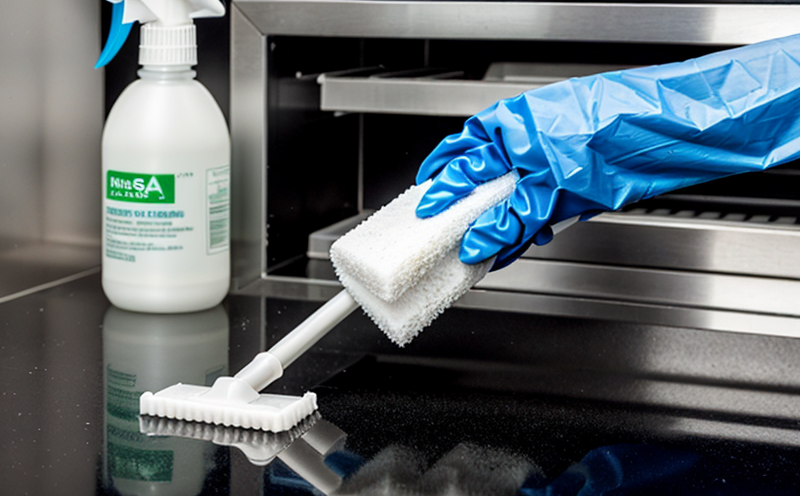DIN EN 13624 Fungicidal Performance Testing of Plastic Hygiene Plastics
The DIN EN 13624 standard is a crucial tool in the assessment of fungicidal performance for plastic hygiene materials used in environments such as healthcare, food processing, and personal care. This testing ensures that plastics designed to prevent fungal growth meet stringent international quality standards.
Plastic materials utilized in hygiene products must not only be durable but also effective in inhibiting fungal growth. DIN EN 13624 provides a standardized method for evaluating the fungicidal performance of plastic products, ensuring they are safe and effective in preventing the spread of fungi that could compromise hygiene standards.
The test procedure involves exposing plastic specimens to a defined fungal inoculum under controlled conditions. The efficacy is then measured by assessing the reduction in fungal colony count after the exposure period. This method helps manufacturers ensure their products meet the stringent requirements set out in this standard, thereby enhancing consumer confidence and regulatory compliance.
For effective testing, it's essential that specimens are prepared according to specified guidelines. This includes selecting appropriate plastic types and sizes suitable for the test conditions. The specimen preparation process is critical as even minor deviations can lead to inaccurate results. After preparation, the samples are exposed to a fungal inoculum in an incubation chamber under controlled humidity and temperature levels.
The incubation period allows the fungi to grow on the plastic surface, where their growth is then measured post-incubation using standard microbiological techniques. The reduction in fungal colony count serves as a direct measure of the fungicidal efficacy provided by the plastic material. This process not only ensures compliance with DIN EN 13624 but also helps in optimizing product design for enhanced hygiene.
Understanding and meeting the requirements set forth in DIN EN 13624 is vital for manufacturers aiming to produce reliable, high-quality hygiene products. By adhering to this standard, they can ensure their products are effective in maintaining a hygienic environment while also complying with international regulations.
Why It Matters
The importance of DIN EN 13624 testing for fungicidal performance cannot be overstated. In environments where hygiene is paramount, such as healthcare facilities and food processing plants, the risk of fungal contamination can lead to serious health issues. Ensuring that plastic materials used in these environments effectively prevent fungal growth is critical.
From a regulatory perspective, compliance with DIN EN 13624 helps manufacturers avoid potential legal challenges and sanctions associated with non-compliance. This standard not only ensures product safety but also enhances brand reputation by demonstrating commitment to high standards of hygiene.
For R&D engineers and quality managers, understanding the nuances of this testing is essential for developing effective products. By leveraging DIN EN 13624, they can optimize their processes, ensuring that new materials meet or exceed the required performance levels. This not only enhances product efficacy but also supports continuous improvement in hygiene standards.
From a compliance officer’s perspective, adhering to DIN EN 13624 ensures that products are up-to-date with international best practices and regulations. This reduces the risk of non-compliance issues, thereby protecting both the company and consumers from potential health risks.
Industry Applications
- Healthcare: Ensuring patient safety by preventing fungal contamination in medical equipment and hygiene products.
- Food Processing: Maintaining product integrity by protecting packaging and processing surfaces from fungal growth.
- Personal Care: Enhancing the effectiveness of hygiene products like toothbrushes, razors, and other personal care items that come into contact with the skin or body.
- Hospitality: Guaranteeing high standards of cleanliness in hotel rooms and public areas to prevent fungal spread among guests.
The use of DIN EN 13624 testing ensures that these applications are not only effective but also compliant with international hygiene standards, thereby enhancing user safety and satisfaction.
Quality and Reliability Assurance
The quality assurance process in DIN EN 13624 testing involves several critical steps to ensure reliability. Specimen preparation is the first step, where materials are selected based on their intended use and prepared according to strict guidelines. This ensures that the test conditions accurately reflect real-world usage.
Once prepared, the specimens undergo a standardized fungal inoculation process in controlled environmental conditions. The incubation period allows for consistent growth of fungi across samples, making the subsequent analysis more reliable. Post-incubation, the reduction in fungal colony count is measured using precise microbiological techniques. This step-by-step approach ensures that results are accurate and reproducible.
Additionally, the use of internationally recognized standards like DIN EN 13624 provides a benchmark for quality assurance. Compliance with these standards not only enhances product reliability but also supports continuous improvement in hygiene standards. By adhering to such stringent testing protocols, manufacturers can ensure that their products meet or exceed international best practices.
Quality and reliability are paramount in the production of hygiene plastics, and DIN EN 13624 provides a robust framework for achieving these goals. Through rigorous testing and adherence to this standard, manufacturers can produce high-quality products that not only meet but also exceed consumer expectations.





